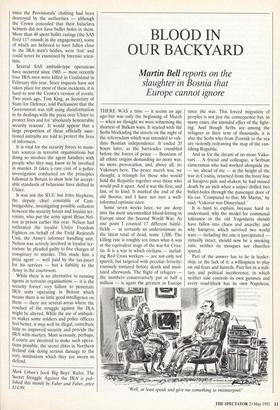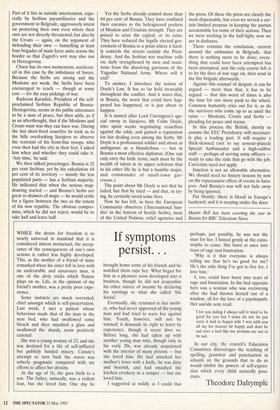BLOOD IN OUR BACKYARD
Martin Bell reports on the
slaughter in Bosnia that Europe cannot ignore
THERE WAS a time — it seems an age ago but was only the beginning of March — when we thought we were witnessing the shortest of Balkan wars. It started with the Serbs blockading the streets on the night of the referendum which was intended to vali- date Bosnian independence. It ended 20 hours later, as the barricades crumbled before the forces of peace — Bosnians of all ethnic origins demanding no more war, no more provocation, and, above all, no Vukovars here. The peace march was, we thought, a triumph for those who would hold the Republic together over those who would pull it apart. And it was the first, and last, of its kind. It marked the end of the old Bosnia; and I have not met a well- informed optimist since.
Some seven weeks later, we are deep into the most uncontrolled blood-letting in Europe since the Second World War. At one point I counted 17 different battle- fields — as certainly an underestimate as the latest total of dead, some 1,300. The killing rate is roughly ten times what it was at the equivalent stage of the war for Croa- tia. It is a war in which civilians — includ- ing Red Cross workers — are not only not spared, but targeted with peculiar ferocity: routinely tortured before death and muti- lated afterwards. The flight of refugees the numbers conservatively put at half a million — is again the greatest in Europe since the war. This forced migration of peoples is not just the consequence but, in many cases, the intended effect of the fight- ing. And though Serbs are among the refugees in their tens of thousands, it is also the Serbs who from Zvornik to the sea are violently redrawing the map of the van- ishing Republic.
And as for the dream of no more Vuko- vars ... A friend and colleague, a Serbian cameraman who had worked alongside me — no, ahead of me — at the height of the war in Croatia, returned from the front line at Sarajevo pale and shaken; he had missed death by an inch when a sniper drilled two bullet-holes through the passenger door of his car. 'Compared to this, Mr Martin,' he said, `Vukovar was Disneyland.'
It is hard to explain, because hard to understand, why the model for communal tolerance in the old Yugoslavia should have fallen into chaos and anarchy; and why Sarajevo, which survived two world wars — including the one it precipitated virtually intact, should now be a smoking ruin, neither its mosques nor churches spared.
Part of the answer has to lie in leader- ship, or the lack of it: a willingness to play on old fears and hatreds. Part lies in a mili- tary and political incoherence, in which neither side controls its own gunmen and every road-block has its own Napoleon.
'Well, at least speak and give me something to misinterpret!' Part of it lies in outside intervention, espe- cially by Serbian paramilitaries and the government in Belgrade, aggressively intent on protecting their own even where their own are not directly threatened; but also by the Croats — again, on the argument of defending their own — funnelling at least four brigades of main force units across the border so that Zagreb's writ may also run in Herzegovina.
Chaos has its own momentum, accelerat- ed in this case by the imbalance of forces. Because the Serbs are strong and the Moslems are weak, the Serbs have been encouraged to reach — though at some cost — for the easy pickings of war.
Radovan Karadzic, President of the self- proclaimed Serbian Republic of Bosnia- Herzegovina, seems in his public utterances to be a man of peace, but then adds, as if as an afterthought, that if the Moslems and Croats want war they can have war. During the last short-lived ceasefire he took us to the hills overlooking Sarajevo to observe the restraint of his front-line troops, who even then had the city at their feet. I asked him when and whether they could take it. `Any time,' he said.
We then talked percentages. Bosnia is 32 per cent Serbian, yet by his calculation 64 per cent of its territory — mostly the less populated parts — has a Serbian majority. He indicated that when the serious map- drawing started — and Bosnia's Serbs are great re-drawers of maps — he would settle for a figure between the two as the extent of his new republic. The obvious compro- mise, which he did not reject, would be to take half and leave half. Yet the Serbs already control more than 64 per cent of Bosnia. They have confined their enemies to the beleaguered pockets of Moslem and Croatian strength. They are poised to seize the capital, or its ruins. They have reduced the legally elected gov- ernment of Bosnia to a point where it hard- ly controls the streets outside the Presi- dency. And the Serbian war machine rolls on, daily strengthened by men and muni- tions from the dissolving garrisons of the Yugoslav National Army. Where will it end?
To answer, I introduce the notion of Doyle's Law. It has so far held invariably throughout the conflict. And it states that, in Bosnia, the worst that could have hap- pened has happened, or is just about to happen.
It is named after Lord Carrington's spe- cial envoy in Sarajevo, Mr Coim Doyle, who spent weeks negotiating ceasefires against the odds, and gained a reputation for fair dealing even among the Serbs. Mr Doyle is a professional soldier and about as ambiguous as a blunderbuss — but in Bosnia a most effective diplomat. (One can only envy the Irish Army, such must be the wealth of talent in its upper echelons that in his other life he is but a humble major, and commander of small-town gar- risons.) The point about Mr Doyle is not that he failed, but that he tried — and that, in try- ing, he certainly saved some lives.
Now he has left, as have the European Community observers (`International ban- dits' in the lexicon of hostile Serbs), most of the United Nations, relief agencies and the press. Of these the press are clearly the most dispensable, but even we served a cer- tain limited purpose in keeping the parties accountable for some of their actions. Then we were working in the half-light; now we are in darkness.
There remains the conclusion, current around the embassies in Belgrade, that there is nothing more to be done; every- thing that could have been attempted has been attempted, and the only course left is to let the fires of war rage on, then send in the fire brigade afterwards.
Against this counsel of despair, it can be argued — more than that, it has to be argued — that this worst of times is also the time for one more push to the wheel. Common humanity cries out for it, as do the survivors who come up to us amid the ruins — Moslems, Croats and Serbs pleading for peace and rescue.
In this process the British, shortly to assume the EEC Presidency, will necessari- ly play a leading part. It will require a thick-skinned (not to say armour-plated) Special Ambassador and a high-calibre staff — perhaps of serving army officers ready to take the risks that go with the job. Careerists need not apply.
Inaction is not an allowable alternative. We should need no history lessons by now on the repercussive effect of events in Sara- jevo. And Bosnia's war will not fade away by being ignored.
Put bluntly, there is blood in Europe's backyard, and it is seeping under the door.
Martin Bell has been covering the war in Bosnia for BBC Television News.



































































 Previous page
Previous page